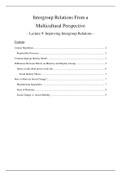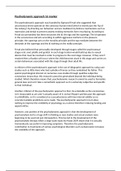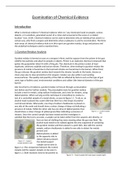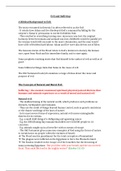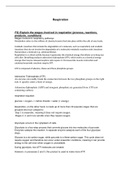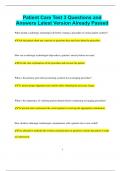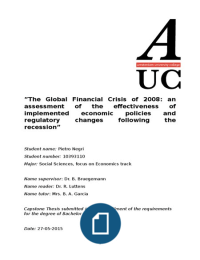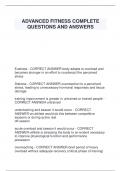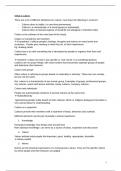PROPERTY OF LAW (CASE STUDIES AND
QUESTION AND ANSWERS )
PVL 3701 SEMESTER 1 YEAR 1 2024/2025
, Case Study
Case Study: The Disputed Inheritance
Background:
John Smith, a prominent businessman in South Africa, recently passed away, leaving behind a
substantial estate that includes various properties. In his will, John designated his three children
—Michael, Sarah, and Emily—as beneficiaries. However, the will was ambiguous regarding the
distribution of one particular property: a beachfront villa in Durban.
Michael, Sarah, and Emily each claim a right to the beachfront villa. Michael asserts that he
should inherit the villa because he was closest to John and often managed the property. Sarah
argues that the villa should be equally divided among the three of them as part of their
inheritance. Emily believes that the villa should be sold and the proceeds divided equally
because it was not clearly specified in the will.
Questions:
1. What principles of property law are relevant to resolving the dispute over the
beachfront villa?
2. How should the ambiguous terms of the will be interpreted according to South
African property law principles?
3. What are the potential remedies available to the beneficiaries if an agreement
cannot be reached?
Answers
1. Principles of Property Law Relevant to the Dispute:
○ Testamentary Freedom: South African property law recognizes the freedom of
testators to distribute their property as they wish. However, the will must be clear
and unambiguous to effectively carry out the testator’s intentions.
○ Intestate Succession: When a will is ambiguous, the principles of intestate
succession (i.e., the legal rules that apply when someone dies without a valid will
or if their will does not cover certain assets) might be considered to determine the
distribution of the estate.
○ Clarity and Precision: South African property law requires that wills be drafted
with sufficient clarity to avoid disputes. If a will lacks clarity, the court may need to
interpret the intentions of the testator based on context and evidence.
2. Interpreting Ambiguous Terms of the Will:
○ Literal Rule: The court will first attempt to interpret the will according to the literal
meaning of its terms. If the will is unclear, the court may look at the overall
context of the will and the testator's intentions.
○ Extrinsic Evidence: In cases of ambiguity, extrinsic evidence such as
statements made by the testator or the surrounding circumstances at the time the
will was created may be used to clarify the testator’s intentions.
○ Rule of Construction: If the ambiguity cannot be resolved through the will itself
or extrinsic evidence, the court may apply principles of construction to infer the
most likely intention of the testator.
3. Potential Remedies for the Beneficiaries:
QUESTION AND ANSWERS )
PVL 3701 SEMESTER 1 YEAR 1 2024/2025
, Case Study
Case Study: The Disputed Inheritance
Background:
John Smith, a prominent businessman in South Africa, recently passed away, leaving behind a
substantial estate that includes various properties. In his will, John designated his three children
—Michael, Sarah, and Emily—as beneficiaries. However, the will was ambiguous regarding the
distribution of one particular property: a beachfront villa in Durban.
Michael, Sarah, and Emily each claim a right to the beachfront villa. Michael asserts that he
should inherit the villa because he was closest to John and often managed the property. Sarah
argues that the villa should be equally divided among the three of them as part of their
inheritance. Emily believes that the villa should be sold and the proceeds divided equally
because it was not clearly specified in the will.
Questions:
1. What principles of property law are relevant to resolving the dispute over the
beachfront villa?
2. How should the ambiguous terms of the will be interpreted according to South
African property law principles?
3. What are the potential remedies available to the beneficiaries if an agreement
cannot be reached?
Answers
1. Principles of Property Law Relevant to the Dispute:
○ Testamentary Freedom: South African property law recognizes the freedom of
testators to distribute their property as they wish. However, the will must be clear
and unambiguous to effectively carry out the testator’s intentions.
○ Intestate Succession: When a will is ambiguous, the principles of intestate
succession (i.e., the legal rules that apply when someone dies without a valid will
or if their will does not cover certain assets) might be considered to determine the
distribution of the estate.
○ Clarity and Precision: South African property law requires that wills be drafted
with sufficient clarity to avoid disputes. If a will lacks clarity, the court may need to
interpret the intentions of the testator based on context and evidence.
2. Interpreting Ambiguous Terms of the Will:
○ Literal Rule: The court will first attempt to interpret the will according to the literal
meaning of its terms. If the will is unclear, the court may look at the overall
context of the will and the testator's intentions.
○ Extrinsic Evidence: In cases of ambiguity, extrinsic evidence such as
statements made by the testator or the surrounding circumstances at the time the
will was created may be used to clarify the testator’s intentions.
○ Rule of Construction: If the ambiguity cannot be resolved through the will itself
or extrinsic evidence, the court may apply principles of construction to infer the
most likely intention of the testator.
3. Potential Remedies for the Beneficiaries:


